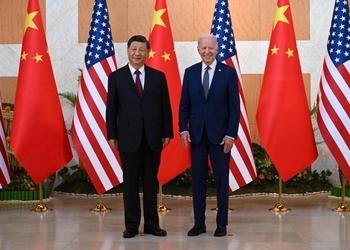China has announced plans to take increased action on precursor chemicals used to synthesize fentanyl, marking an important step in attacking the flow of these substances into Mexico.
The presidents of China, the United States, and Mexico agreed to increase cooperation to address the fentanyl crisis following talks at the Asia-Pacific Economic Cooperation (APEC) forum, which took place in San Francisco, United States, between November 11 and 17.
During a November 15 meeting, Chinese President Xi Jinping and US President Joe Biden announced they would resume counter-narcotics cooperation following a multi-year suspension, with a particular focus placed on precursor chemicals and the companies involved in their production.
The Chinese government committed to targeting suppliers of precursor chemicals and sent out a warning to companies involved in distributing those chemicals and pill press machines, which are used to manufacture synthetic drugs in Mexico.
SEE ALSO: How Fentanyl Is Synthesized in Mexico
“We are taking action to significantly reduce the flow of precursor chemicals and pill presses from China into the Western Hemisphere,” Biden told reporters on November 16. “It’s going to save lives, and I appreciate President Xi’s commitment on this issue.”
Mexico President Andrés Manuel López Obrador also said that he had agreed to continue working with President Xi, specifically regarding the flow of chemical precursors.
China was the main source country for illicit fentanyl coming into the United States until 2019, when the Chinese government banned its production and that of some precursors. In China’s absence, Mexico emerged as the main producer of illicit fentanyl trafficked to the United States, worsening a drug overdose crisis that claimed over 100,000 lives in 2022 alone, the majority from deadly synthetic opioids like fentanyl. But a large part of the precursors used in the illicit production of fentanyl arrive from China.
In recent years, the relationship between the three countries regarding fentanyl has been tense. In addition to the lapse in cooperation between China and the United States, the Chinese government has also blamed Mexican customs for the continued arrival of precursor chemicals into the country.
InSight Crime Analysis
Cooperation between China, Mexico, and the United States is key to addressing the US fentanyl crisis. However, reducing the flow of fentanyl into the country is a monumental task that will require coordination with multiple countries along the precursor supply chain.
A novel element in the strategy just announced by China is increased judicial pressure on companies producing precursor chemicals. This has been one of the main demands of the US government in the past.
InSight Crime’s investigation into the flow of precursor chemicals used in the production of methamphetamine and fentanyl in Mexico found that there are at least 188 companies — located primarily in China’s Hebei and Hubei provinces — that produce precursor and pre-precursor chemicals used to manufacture both synthetic drugs.
SEE ALSO: How Precursor Chemicals Sustain Mexico’s Synthetic Drug Trade
These companies participate in China’s booming chemical industry and move between regulatory gray zones to produce legal and illegal precursor chemicals. The companies promote the chemicals they produce on the internet and guarantee shipments to different countries around the world, including Mexico, through international postal services.
The United States has imposed sanctions on Chinese companies producing and marketing these chemicals as one of its main strategies to affect the fentanyl supply chain. Thus, the announcement of new measures by China shows a key step forward in cooperation between both countries.
However, increased cooperation alone will not eliminate the flow of precursors from the country. Greater control over precursor chemicals and companies in China may lead illegal fentanyl producers to seek access to these substances through other countries that, like China, have substantial chemical and pharmaceutical industries.
One of those countries is India, which is already a major source of precursor chemicals used for illegal fentanyl production in Mexico.
“The chemical industry in India is large, very poorly regulated, and could very easily become the new supplier if China went completely offline,” Vanda Felbab-Brown, an investigator at the Brookings Institution, told InSight Crime.
However, India may not be the only one. Differences in how these substances are regulated in each country and the major legal industries that require these substances for chemical, pharmaceutical, and agro-industrial purposes provide a window of opportunity for illegal actors to access essential raw materials through legal loopholes.

